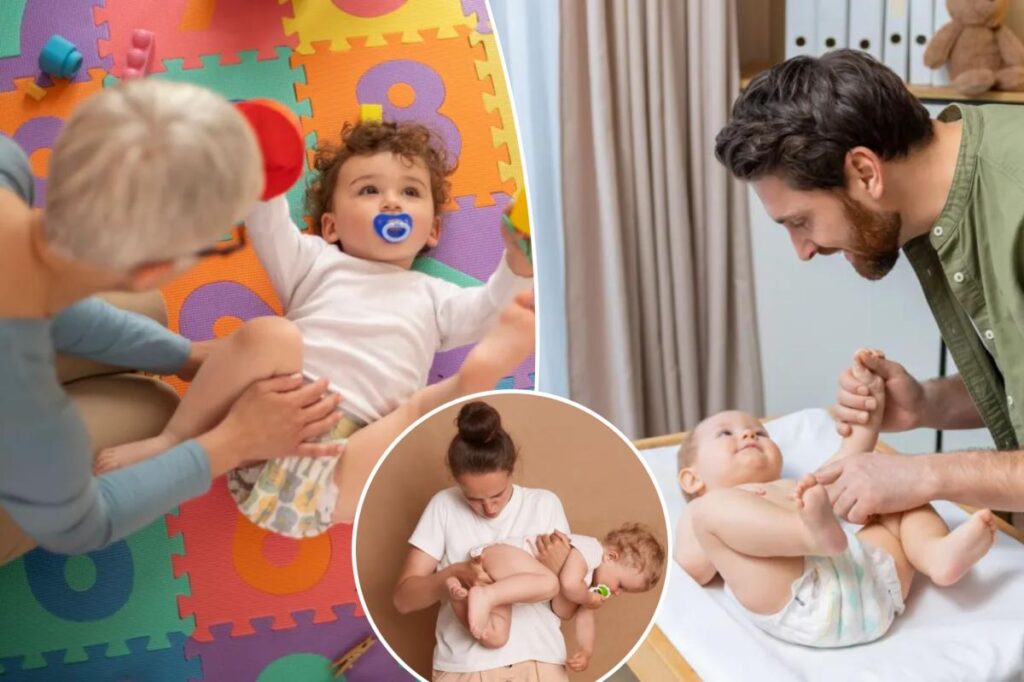It‚Äôs a move that might¬Ýstink¬Ýto some parents, but there‚Äôs a new-age way to change a newborn‚Äôs undies.¬Ý
Drenched diapers are no longer messes that need to be ripped off a baby’s bottom posthaste, according to new advice by early childhood development researchers in Australia.
Instead, the experts encourage moms and dads to request an infant’s consent — you read that correctly — before changing their diaper.
“At the start of a nappy change, ensure your child knows what is happening,” researchers from Deakin University wrote in a November 2025 guide. “Get down to their level and say, ‘You need a nappy change,’ and then pause so they can take this in.”
But their offbeat directives for cleaning a cutie‚Äôs patootie ‚Äî a task that parents often rush to ‚Äújust get done,‚Äù the researchers said ‚Äî don‚Äôt end there.¬Ý
“Then you can say, ‘Do you want to walk [or] crawl with me to the [changing] table, or would you like me to carry you?’” said the specialists, seemingly ignoring that newborns can’t yet actually chat up mom or dad one-on-one. “Observe their facial expressions and body language to check if they understand what is happening.”
The experts further noted: “This can be a time to help children learn about consent and how their bodies work.”
The authors of the report did not immediately respond to The Post‚Äôs request for a comment.¬Ý
However, having heart-to-hearts with rugrats every time they go No. 1 or 2 could fall under the ever-controversial category of gentle parenting.¬Ý
It‚Äôs an ultra-permissive, anti-authoritarian approach to child-rearing that prioritizes¬Ýempathy, respect, connection and communication over rules and punishments.¬Ý
The softy strategy is popular with Gen Zers and millennials — mothers and fathers under age 46. However, it’s been widely bashed by online critics who claim the overindulgent, unconventional parenting style turns untamed tykes into knee-high “hellions.”
The new research additionally recommends inviting babies to participate in the grooming ritual, asking them questions like ‚ÄúCan you please lift up your bottom so I can slide your nappy out?‚Äù ¬Ý
‚ÄúThese habits plant the seed of the idea that a child has the right to say what happens to their body,‚Äù assured the academics.¬Ý
Eccentricity notwithstanding,¬ÝYamalis Diaz, a clinical child psychologist with NYU Langone Health, suggested to The Post that verbally involving a baby in the diaper-changing process is great practice for future discussions about body autonomy ‚Äî even if the infant can‚Äôt yet high-five a parent for a diaper-changing job well done.¬Ý
“This is more about integrating the teaching of consent into the [adult’s] parenting practices early on,” Diaz said. “It’s aimed at increasing the parents’ awareness of all the ways that the need for consent occurs in a child’s life.”
When it comes to having these important chats with kiddos, the sooner, the better, Diaz added. Ensuring consent remains “part of the conversations throughout early development.”
“Parents and kids will be more comfortable talking about and establishing boundaries,” she said.
Lesley Koeppel, a NYC-based psychotherapist, agrees.¬Ý
“Babies cannot verbally agree or disagree, but parents can still narrate what they are doing,” she told The Post. “This builds a foundation for bodily autonomy long before a child has language.”
Of course, Koeppel clarified that talking consent with babies is “symbolic rather than literal.”
‚ÄúThe validity of this approach lies in its message. You matter. Your body matters. I will always tell you what I am doing,‚Äù she said. ‚ÄúThis becomes the template for healthy boundaries later in life.‚Äù¬Ý
Still, the Deakin researchers maintain that gentle diaper-changing is a game-changer when it comes to teaching babies about safety.¬Ý
‚ÄúIt‚Äôs important children notice when someone is touching their most intimate parts,‚Äù said the insiders, warning parents not to distract small children with songs, toys or rattles during the changing process.¬Ý
“Even in early infancy, children can respond to consistent verbal cues,” they noted. “So try to use similar language and follow regular nappy changing routines that involve children in conversation.”
They even strongly propose using the anatomically correct names for private parts ‚Äî such as vulva, penis and anus ‚Äî while changing and bathing a baby.¬Ý
“Parents may feel uncomfortable doing this and think more childish names should be used,” acknowledged the researchers. “But this keeps children safe, as it means they can then inform trusted adults about their experiences with all the people who care for them.”
The pros said their pre-potty training pointers are meant to help, rather than overwhelm, busy mommies and daddies worldwide.¬Ý
“The habits we outline above may also seem to add more work to the already demanding parental load,” they concede. “So try and do them as often as possible and be kind to yourself if every nappy change isn’t a perfect moment of connection.”
“You are supporting a small child after all.”
Read the full article here














